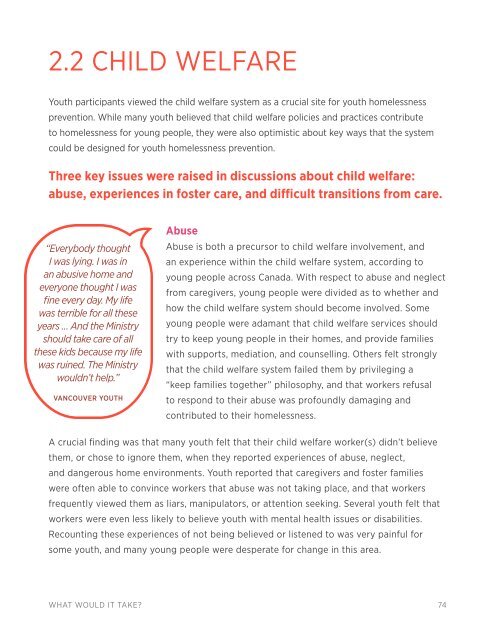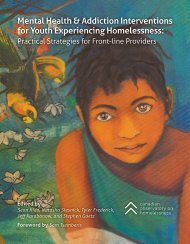COH-AWH-What_Would_it_Take
Create successful ePaper yourself
Turn your PDF publications into a flip-book with our unique Google optimized e-Paper software.
2.2 CHILD WELFARE<br />
Youth participants viewed the child welfare system as a crucial s<strong>it</strong>e for youth homelessness<br />
prevention. While many youth believed that child welfare policies and practices contribute<br />
to homelessness for young people, they were also optimistic about key ways that the system<br />
could be designed for youth homelessness prevention.<br />
Three key issues were raised in discussions about child welfare:<br />
abuse, experiences in foster care, and difficult trans<strong>it</strong>ions from care.<br />
“Everybody thought<br />
I was lying. I was in<br />
an abusive home and<br />
everyone thought I was<br />
fine every day. My life<br />
was terrible for all these<br />
years … And the Ministry<br />
should take care of all<br />
these kids because my life<br />
was ruined. The Ministry<br />
wouldn’t help.”<br />
VANCOUVER YOUTH<br />
Abuse<br />
Abuse is both a precursor to child welfare involvement, and<br />
an experience w<strong>it</strong>hin the child welfare system, according to<br />
young people across Canada. W<strong>it</strong>h respect to abuse and neglect<br />
from caregivers, young people were divided as to whether and<br />
how the child welfare system should become involved. Some<br />
young people were adamant that child welfare services should<br />
try to keep young people in their homes, and provide families<br />
w<strong>it</strong>h supports, mediation, and counselling. Others felt strongly<br />
that the child welfare system failed them by privileging a<br />
“keep families together” philosophy, and that workers refusal<br />
to respond to their abuse was profoundly damaging and<br />
contributed to their homelessness.<br />
A crucial finding was that many youth felt that their child welfare worker(s) didn’t believe<br />
them, or chose to ignore them, when they reported experiences of abuse, neglect,<br />
and dangerous home environments. Youth reported that caregivers and foster families<br />
were often able to convince workers that abuse was not taking place, and that workers<br />
frequently viewed them as liars, manipulators, or attention seeking. Several youth felt that<br />
workers were even less likely to believe youth w<strong>it</strong>h mental health issues or disabil<strong>it</strong>ies.<br />
Recounting these experiences of not being believed or listened to was very painful for<br />
some youth, and many young people were desperate for change in this area.<br />
WHAT WOULD IT TAKE? 74
















